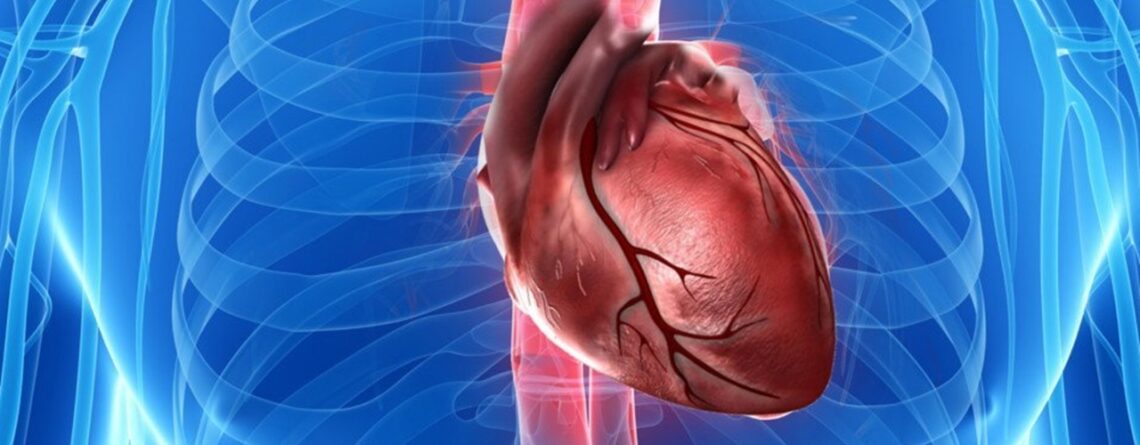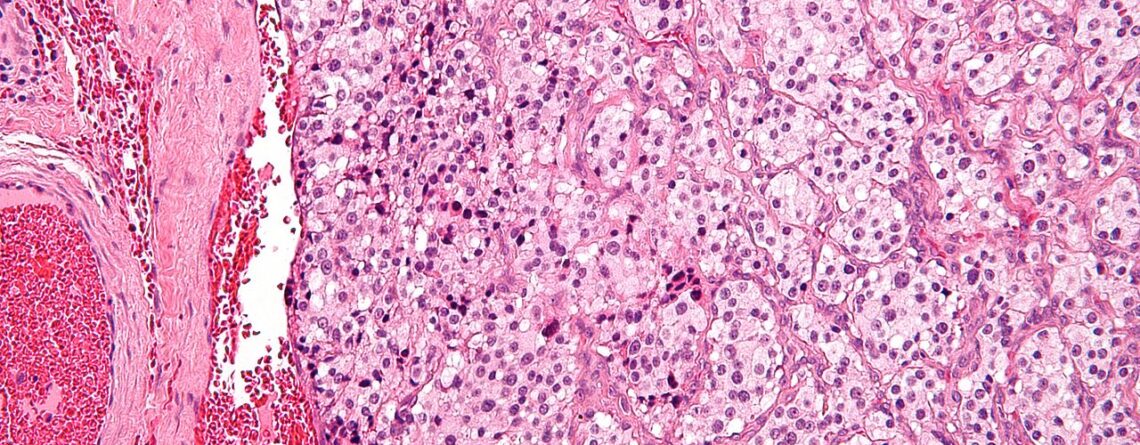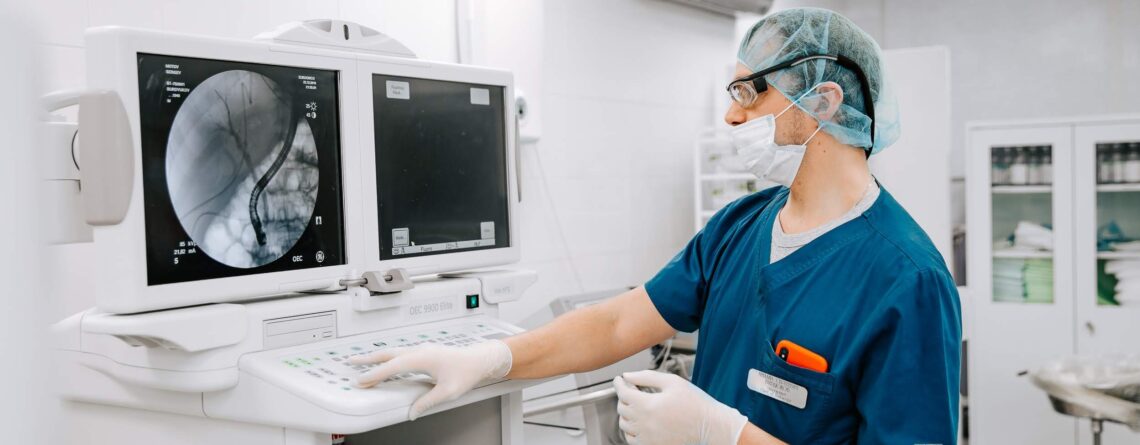Heart tumors are rare neoplasms that can affect all structures of heart, but myocardium and endocardium are most often affected. Cardiac tumors can be primary (benign or malignant) and metastatic (always malignant). They can cause valve or outflow tract obstruction, thromboembolism, arrhythmias or pericardial pathology. Diagnosis is established with the help of echocardiography and MRI of heart. Usually, such neoplasms are removed surgically, although they can recur.

Myxoma, a benign tumor, is the most common type of primary cardiac tumor. Metastatic tumors occur 30-40 times more often than primary lesions. Metastatic involvement of heart commonly occurs in lung cancer, breast cancer, kidney cancer, melanoma, and lymphoma.
Heart tumors, especially malignant tumors, are serious diseases , but with the right tactics, they are completely curable. Cardiac surgeons and oncologists are mainly engaged in their diagnosis and treatment. All necessary specialists work in Oncology Department of Maimonides multidisciplinary medical center. Our institution functions according to the model of the most modern Israeli oncology centers, as well as in close cooperation with them. Each clinical case is simultaneously observed by the attending oncologist, the head of the department – Dr. Iryna Stefanska and responsible oncologist directly from Israel. Thanks to such coordinated work of a professional team, it is possible to achieve significant success in treatment of even the most complex heart tumors cases.
It is no secret that malignant neoplasms treatment, especially those localized in heart, is a rather expensive process. But our patients have the opportunity to receive help that will cover part or even the entire range of necessary medical services, because Maimonides Medical Center works under the patronage of “Keren Or for our Child” the Charitable Foundation.
All our doctors have appropriate qualifications and extensive experience in managing oncology patients. Most of them have repeatedly trained on the basis of the best oncology clinics in the world. In their daily practice, our specialists are guided only by modern clinical recommendations and treatment protocols, and not by 20-year-old domestic methods, so there can be no doubt about the quality of medical services provision. At the same time, all specialists practice an individual approach to each patient and his clinical case, because there are no two identical people and identical tumors. Making up a treatment and diagnostic program, doctors take into account age, patient’s gender, the main diagnosis, the type of tumor, its histological and molecular genetic features, the stage of disease, general health state, concomitant serious diseases presence and, in fact, patient’s wishes regarding treatment.
A whole multidisciplinary team of specialists works in Oncology Department Maimonides Medical Center. Oncologists, general surgeons, thoracic surgeons and cardiac surgeons, cardiologists, radiation therapists, chemotherapists, rehabilitators, radiologists, functional diagnosticians, psychologists and other specialists, depending on clinical case, provide assistance to a patient with heart neoplasms. Our department is equipped only with modern medical and diagnostic equipment of an expert class. If a certain narrow specialist or rare medical and diagnostic equipment is not available, patient is referred to subsidiary institutions of Maimonides Medical Center or our Israeli partner clinics, where he is guaranteed to receive the full range of necessary medical services.
Types of heart tumors
All neoplasms in heart are divided into primary (growing directly from heart tissue), which can be benign and malignant, and secondary – these are metastases of malignant tumors from other organs. Among primary tumors, benign occur in 80% of cases, malignant – in 20%.
Examples of benign primary heart tumors can be myxomas, papillary fibroelastomas, rhabdomyomas, fibromas, hemangiomas, lipomas, paragangliomas, and pericardial cysts.
Myxoma is the most common primary benign heart tumor, accounting for 50% of all cases. In women, myxomas occur 2-4 times more often than in men. In isolated family forms of the disease (Carney syndrome) , men are more often affected. About 75% of mixed tumors affect the left atrium, in other cases single or, in some cases, multiple tumors arise in other chambers of heart. Myxomas can reach up to 6 inch in diameter. About 75% of them are located on leg, can leak through mitral valve and prevent ventricle filling during diastole.
Papillary fibroelastomas are avascular papillomas that occur on heart valves in more than 80% of cases. Papillomas grow more often in the left half of heart, mainly on aortic and mitral valves. Men and women get sick equally. About 45% of such neoplasms are located on leg. They do not cause valve dysfunction, but increase the risk of embolism.
Rhabdomyomas, as a rule, are multiple and are located intramurally in septum or free wall of the left ventricle, where they affect heart conduction system. They are solid white lobular neoplasms that usually regress on their own with age. A minority of patients develop arrhythmia and heart failure due to impaired outflow from left ventricle.
Fibroids usually occur in children and are associated with skin keratoacanthoma and kidney tumors. They appear mainly in the left side of heart. They can squeeze or grow into heart conduction system, causing arrhythmias, conduction disturbances and sudden cardiac death.
Hemangiomas have almost no symptoms in most patients. As a rule, they are discovered accidentally during examinations that are performed for other reasons.
Teratomas of pericardium occur mainly in newborns and children. They are often located at large vessels base. 90% is localized in anterior mediastinum; the rest is in posterior mediastinum.
Lipomas can occur in patients of any age. They are located in endocardium and epicardium and have a large stalk at the base. Most of them are asymptomatic, but some interfere with blood flow and can cause arrhythmias.

Paragangliomas, including pheochromocytoma, rarely arise in heart. They can be manifested by symptoms caused by catecholamine hormones production (for example, increased heart rate and blood pressure, increased sweating, tremors). Paragangliomas can be benign or malignant.
Pericardial cysts may look like tumors or pericardial effusion on X-ray. Usually asymptomatic, but some cause symptoms of nearby organs compression (for example, chest pain, shortness of breath, cough).
Malignant primary tumors include sarcomas, pericardial mesotheliomas, and primary lymphomas..
Sarcoma is the most common malignant tumor of heart. Middle-aged patients mostly suffer (average age 44 years). Almost 40% of them are angiosarcomas, most of which arise in right atrium and affect pericardium, causing right ventricle outflow tract obstruction, pericardial tamponade, and lung metastasis. Other types of sarcoma include undifferentiated sarcoma, malignant fibrous histiocytoxanthoma, leiomyosarcoma, fibrosarcoma, rhabdomyosarcoma, liposarcoma, and osteosarcoma. These types of neoplasms most often occur in left atrium, causing mitral valve occlusion and heart failure.
Pericardial mesothelioma is rare. Patients of various ages suffer, mostly men. Tumor causes heart tamponade and can produce metastases in spine, adjacent soft tissues and brain.
Primary lymphoma is a very rare mediastinum tumor. It usually occurs in patients with HIV/AIDS or other immunodeficiency conditions. These tumors grow rapidly and cause heart failure, arrhythmias, cardiac tamponade and superior vena cava syndrome.
Metastatic tumorsare secondary cardiac malignant neoplasms that are much more common than primary ones. Melanoma is a tumor characterized by a high probability of heart damage. Lung and breast carcinoma, soft tissue sarcoma, and kidney cancer also often metastasize to heart tissue.
Symptoms of heart tumors
First of all, symptoms of heart tumors depend on size and localization of neoplasms. In most cases, such neoplasms are small in size, do not cause hemodynamic disturbances, therefore they are not manifested in any way, but are diagnosed completely by chance.
All symptoms can be divided into 3 groups:
- Extracardiac (outside the heart) – fever, drowsiness, chills, joint pain, unmotivated weight loss, shortness of breath, chest discomfort.
- Intramyocardial (in case heart muscle damage) – arrhythmias, conduction disturbances in heart – blockades.
- Intracavity symptoms – due to a violation of heart valvular apparatus function and/or blood flow (with valvular stenosis development, valvular or heart failure). Intracavitary symptoms may depend on body position, which can change hemodynamics.
Symptoms and signs of malignant heart tumors have an acute onset and rapid development than benign tumors. Cardiac sarcomas usually cause symptoms of ventricular outflow tract obstruction and cardiac tamponade. Mesothelioma causes signs of pericarditis or cardiac tamponade . Primary lymphoma causes refractory progressive heart failure, tamponade, arrhythmias, and superior vena cava syndrome. Metastatic heart tumors can manifest as a heart sudden expansion, its tamponade (due to the rapid accumulation of hemorrhagic effusion in pericardial cavity), blockades of heart conduction system, other arrhythmias, or sudden cardiac death. General symptoms may also be present – fever, malaise, weight loss, night sweats, loss of appetite.
Heart tumors modern treatment
Timely diagnosis of heart tumors, especially malignant ones, is the key to successful treatment. Maimonides clinic uses only modern diagnostic equipment of expert class . All our doctors have a perfect command of all diagnostic methods and interpret received data without error, which is absolutely necessary for creating a modern, individual and effective treatment plan.
Diagnosis of heart tumors is difficult due to symptoms and signs similarity of tumor growth with other, much more common heart diseases. Diagnosis is confirmed by echocardiography. Transesophageal echocardiography is better suited for atrial tumors visualization, and transthoracic for ventricular tumors.

Magnetic resonance imaging (MRII) of heart is often used to determine tumor tissue characteristics and to recognize its type. If results are equivocal, synchronized radionuclide imaging and computed tomography (CT) may be ordered. Compared with other methods, contrast-enhanced heart CT can provide detailed information about neoplasm.
Neoplasm biopsy is not usually used because imaging techniques often distinguish between benign and malignant tumors, and biopsy can promote cancer cells spread in patients with malignant primary heart tumor.
Innovative methods such as PET-CT, PET-MRI, and bone scintigraphyare used for a complete body scan and detection of possible distant metastases. These examinations help to establish the stage of the malignant process correctly and to choose an effective treatment for each stage and each patient. All necessary diagnostic procedures can be performed directly in the clinic, without leaving Ukraine.
Heart tumors modern treatment
Undoubtedly, one of the best treatment advantages at Maimonides Medical Center is a comprehensive approach application to heart tumors therapy. In the fight against disease, oncologist uses the entire available arsenal of treatment methods. Therapy is always combined from several methods. As a rule, treatment regimen includes tumor surgical removal in combination with chemotherapy and/or radiation therapy in the case of malignant neoplasms . In some cases, innovative treatment methods are added to the treatment program (targeted drugs, immunobiological drugs, etc.).
Benign cardiac tumors are treated only by surgery. As a rule, surgery is performed on an open heart under conditions of artificial blood circulation. In most cases, cardiac surgeons manage to completely tumor remove with tissue defect suturing . If the defect is large, a patch is installed. Sometimes, after tumor removing, there is a need to place an artificial pacemaker or an artificial valve. Our cardiac surgeons master the technique of such interventions, and if it is necessary to replace a valve or insert a pacemaker, they use only proven medical products from the best manufacturers in the world . If patient refuses surgery, the only alternative is long-term anticoagulant therapy to reduce complications risk such as thrombosis.
If a malignant tumor is diagnosed and, according to additional examination results, it is determined to be resectable, then cardiac surgery is performed to remove the neoplasm . In cases of inoperable tumors, oncologists prescribe systemic therapy (chemotherapy and radiation therapy). In heart malignant metastatic lesions, percutaneous embolization of coronary artery, which supplies blood to the tumor, can be an alternative treatment method of a single metastasis.
At Maimonides Medical Center , chemotherapy is used for malignant heart tumors treatment in complex. Our specialists prescribe only drugs of the latest generation, which have a minimum number of undesirable reactions from the side of healthy surrounding tissues. Doctors select chemotherapeutic drugs for each patient individually, taking into account person’s characteristics and his illness.
Radiation therapy is also used in the case of heart malignant neoplasms. As a rule, they use remote radiation with the help of modern linear accelerators. Such innovative devices can provide targeted tumor radiation, minimizing dose for the rest of surrounding healthy tissues and organs. Modern linear accelerators available to our patients allow us to perform intensity modulated radiation therapy (IMRT), rotational (moving radiation) with beam intensity modulation (VMAT), as well as stereotaxic radiation therapy (SRT) and stereotaxic radiosurgery (SRS). Such equipment allows us to effectively fight cancer diseases that were previously considered incurable.
The decision about certain methods combination for heart tumor therapy (which methods to start with, what to add next, at what stage of treatment to perform surgery, when and according to which scheme to apply chemotherapy, whether to use targeted drugs or other immunobiological drugs) is taken only in consultation by a team of specialists. Our doctors, relying on their experience in oncological pathologies treatment, often go beyond the standard protocols, changing treatment regimens and doses of the necessary drugs, radiation method in order to obtain the best possible results for their patients.
